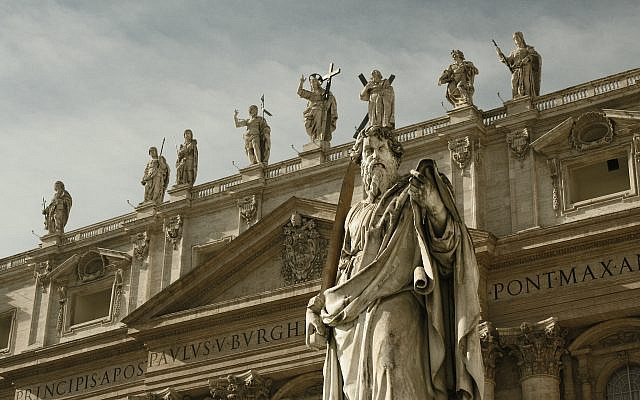In an unusual move, on the eve of Easter, China has appointed a new bishop to Shanghai, the largest Roman Catholic diocese in China, without informing the Vatican. This is not the first time when China side-lined the bilateral pact signed with Vatican over the appointment of Bishops. Its action has contested the Vatican’s authority in the world and has set a bad precedent.
According to the Vatican news, Holy See learnt from media about the transfer of Chinese Bishop Shen Bin to Shanghai. The Vatican said that the Holy See was informed “a few days ago” of the decision by China to transfer Bishop Shen Bin from Haimen, in Jiangsu province, to the diocese of Shanghai. The announcement came four months after the Vatican accused China of violating its bilateral accord on the appointment of bishops by installing one in a diocese not recognized by the Holy See. The secret pact was renewed last October for the second time since 2018after a lot of efforts.
Vatican vs appointment of bishops
Vatican City is supposed to administer Catholic affairs all over the world. The authority claimed by the Roman Curia, especially the right to appoint bishops, inevitably conflicts with other states’ sovereignty, per se the supreme power of internal jurisdiction. Secular regimes advocate the principle of “separation of church and state” to solve the conflict and the state allows the Pope to exercise the power of managing Catholic affairs stipulated by the Canon Law, while he does not interfere in secular affairs.Israel’s Judiciary: Reform or Ruin?Keep Watching
Skip Ad
Ironically, China is perhaps the only country to have brazenly contested the authority of Vatican to show its supremacy. It is the only country having issues including political with Vatican. The reality is that the People’s Republic of China and the Vatican do not share cordial diplomatic relations especially after Xi took over the reign in 2012. Xi Jinping has been enhancing the CCP’s predominant role in every perspective, including religion with an intention that the Party exercises overall leadership over all areas of endeavour in every part of the country.”
What is China’s stand on Churches?
Beijing has its own style of functioning with regard to Bishops. It elects and appoints its own bishops through its Bishops Conference of Catholic Church in China (BCCCC), an autonomous ecclesiastic organization. The Chinese Patriotic Catholic Association (CPCA), which aims to show that the Chinese Catholic Church exercises independence and has severed its political and economic ties with Vatican. The two organizations used to be at the mercy of a state organ, the former State Administration for Religious Affairs (SARA), which was incorporated into the CCP’s United Front Work Department (UFD) in China’s 2018 institutional reform.
As far as Shen is concerned, Shen’s appointment has opened a pandora’s box. Ironically, Shen who headed the Council of Chinese Bishops chose himself as a bishop of Shanghai which is unheard of. More so, the Council of Chinese Bishops which is essentially controlled by the Chinese Communist Party, has not been recognised by the Holy See. Shen remained quite on the state of affairs of Churches in China but preferred to speak about patriotism. On its website, the diocese of Shanghai quoted Bishop Shen Bin who said that he will continue to carry forward the fine tradition of patriotism and love of the Catholic Church in Shanghai (and) adhere to the principle of independence and self-government.
Spotlight on China
A report of Recorded Future, a threat intelligence firm, suspects China’s intention and accused it of using malicious software to slip into the Vatican’s internal networks. “Our research uncovered a suspected China state- sponsored campaign targeting multiple high-profile entities associated with the Catholic Church ahead of the likely renewal of the provisional China- Vatican deal in September 2020,” analysts at Recorded Future reported. The report clearly pointed fingers at China’s ill intention stating that targeting the Vatican was part of China’s ongoing plan to seize control of the country’s underground Catholic church, whose leaders are not approved by the state- run China Patriotic Association.
ADVERTISEMENT
The status of those churches and questions about who has the power to name bishops are at the crux of the negotiations between China and the Vatican. China also is keeping a close eye on the church’s stance on pro- democracy protests in Hong Kong, according to the report.
The report clearly pointed out about the restriction on religious freedom in China for Christians and other minorities.It may be mentioned here that only six new bishops have been appointed since the 2018 deal was struck between the Vatican and China.
Analysts do not rule out the possibility of China openly violating the provisions of deal signed with Vatican and pushing the agenda of Xi Jinping who wants to have a control on every institution.They fear for the rights of Christians and other minorities under Xi Jinping’s rule.
ABOUT THE AUTHOR
Sergio Restelli is an Italian political advisor, author and geopolitical expert. He served in the Craxi government in the 1990’s as the special assistant to the deputy Prime Minister and Minister of Justice Martelli and worked closely with anti-mafia magistrates Falcone and Borsellino. Over the past decades he has been involved in peace building and diplomacy efforts in the Middle East and North Africa. He has written for Geopolitica and several Italian online and print media. In 2020 his first fiction “Napoli sta bene” was published.
blogs.timesofisrael.com

